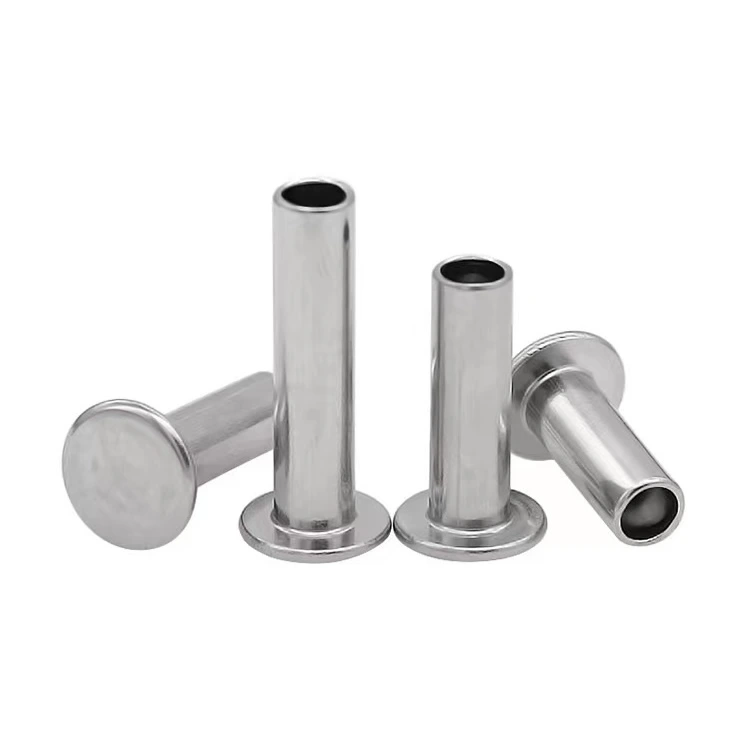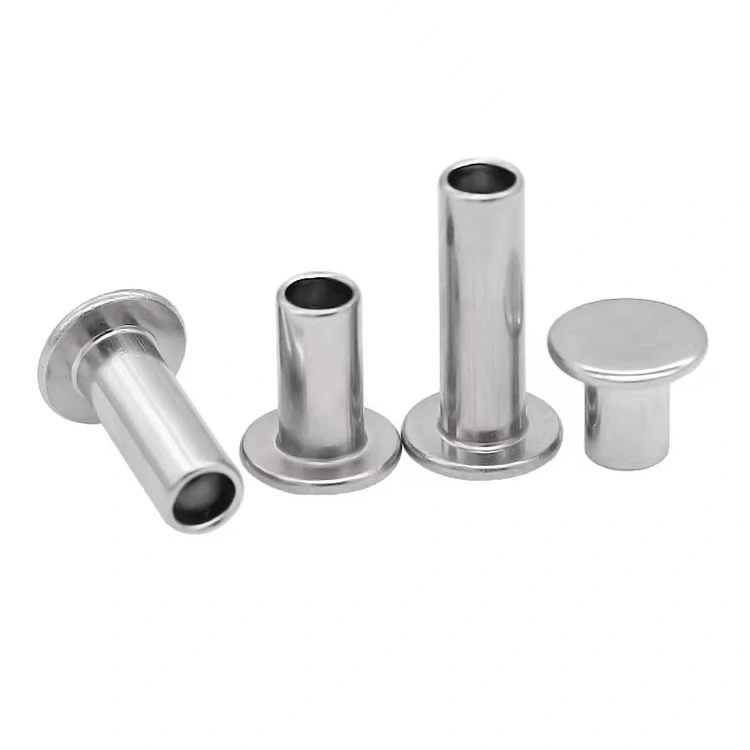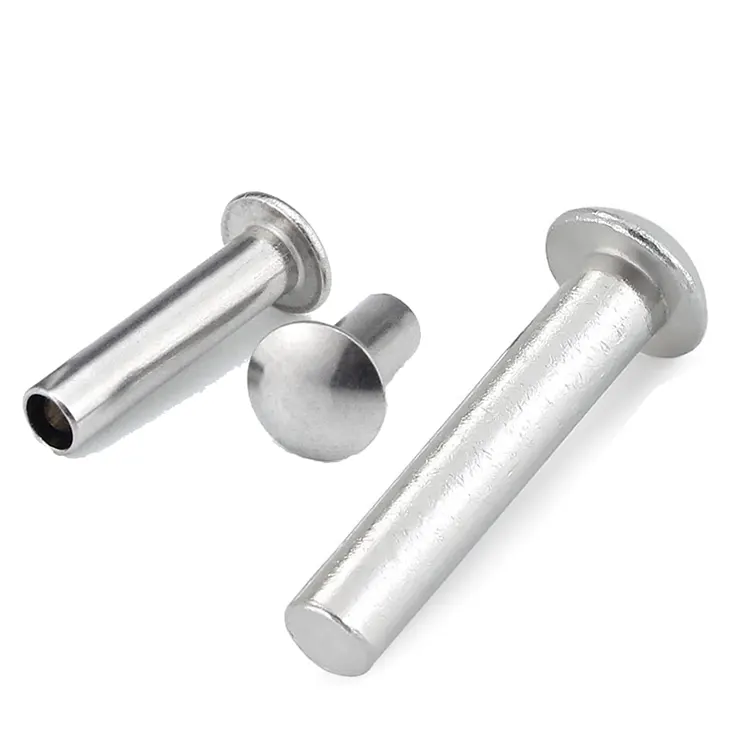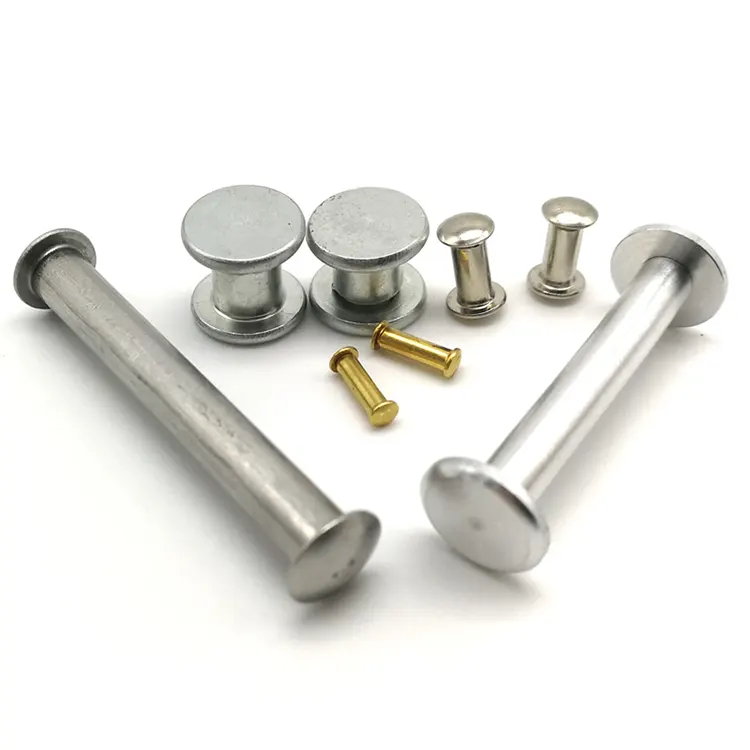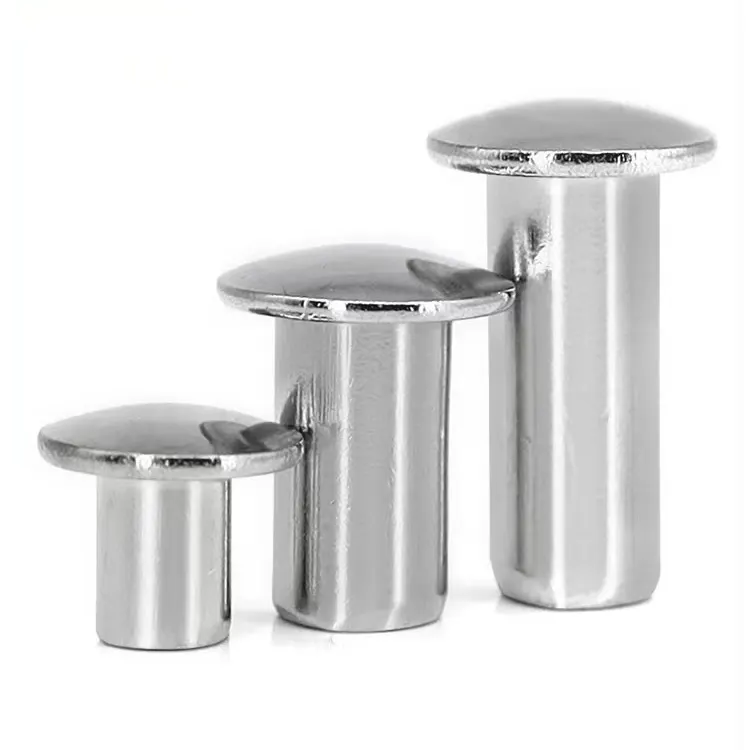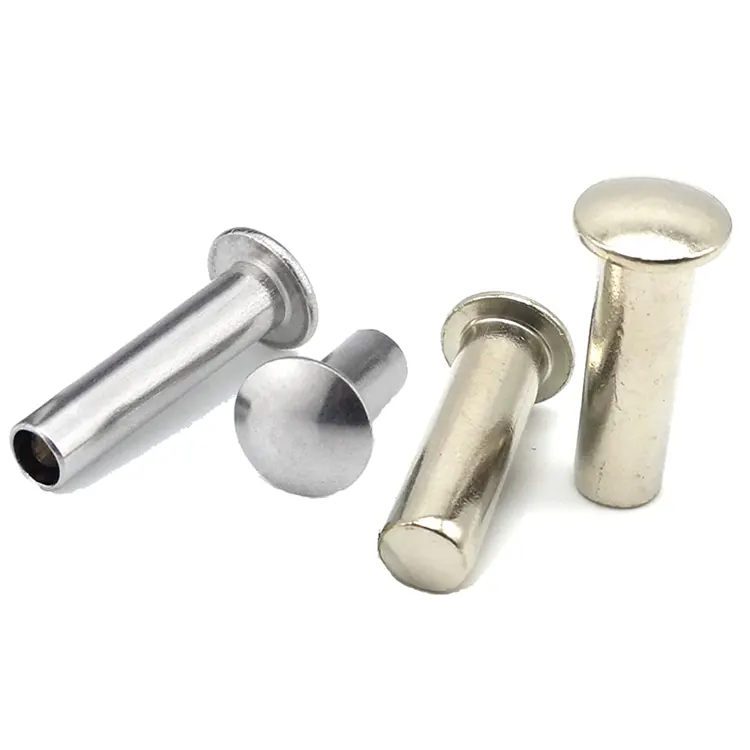Rebites
As one of professional manufacturer in China, Notin would like to provide you Rivets. And we will offer you the best after-sale service and timely delivery.
What is a rivet?
A rivet is a permanent mechanical fastener used to join two or more materials. Rivets work by inserting a metal pin into an aligned hole and deforming the end, creating a strong, secure, and durable connection. Unlike temporary fasteners like screws, rivets do not rely on threads, but instead form a permanent connection, making them ideal for applications requiring high strength, durability, and vibration resistance.
Classification of Rivets
Rivets are typically categorized by head shape, degree of hollowness, or material.
Based on head shape, rivets can be classified as flat head rivets, round head rivets, countersunk head rivets, mushroom head rivets, universal head rivets, truss head rivets, etc.

Based on degree of hollowness, rivets can be classified as solid rivets, semi-tubular rivets, or full tubular rivets.
Based on material, rivets can be classified as brass rivets, stainless steel rivets, steel rivets, aluminum rivets, copper rivets, etc.

What surface finishes are available for rivets?
Rivet surfaces are typically treated with rust-proofing treatments, primarily electroplating, including zinc plating, nickel plating, chrome plating, tin plating, gold plating, and silver plating. Electroplating is a common rust-proofing method for rivets. It applies a layer of plating to the rivet surface through physical or chemical methods. The plating effectively prevents corrosion and rust, while also providing a certain aesthetic effect.
Another special surface treatment method is head coating. Head coating is performed after the rivet is electroplated. This allows for a variety of colors on the rivet head, achieving an aesthetically pleasing finish.
Aluminum rivets cannot be electroplated, but they can be anodized. Anodizing also allows for a variety of color options, but the unit price is higher than electroplating.
Rust-proofing the rivet surface is crucial, effectively extending the rivet's service life and ensuring a secure connection. Different rust-proofing methods are suitable for different environments and applications, so the choice should be tailored to the specific situation.
- View as
Rebites meio tubulares de alumínio
Somos a Nuote Metals, um fabricante de rebites com sede em Dongguan, China, e enviamos nossos rebites para todo o mundo. Os rebites semi-tubulares de alumínio são um tipo muito comum de fixador mecânico usado em diversas indústrias. Eles têm uma cabeça sólida e uma cauda oca, o que proporciona uma conexão rápida e sólida quando você os rebita no lugar. Esses rebites geralmente são feitos de liga de alumínio, por isso são leves e não enferrujam facilmente.
consulte Mais informaçãoEnviar consultaRebites Semi Tubulares
Ei, deixe-me falar sobre esses rebites meio ocos de alumínio. Eles são basicamente pequenos conectores de metal feitos de alumínio. A parte legal? Eles são projetados com um espaço parcialmente oco que não atravessa completamente. Uma extremidade vem pronta com uma cabeça, e você apenas usa uma ferramenta especial para bater na outra extremidade - isso faz com que ela se espalhe e segure as coisas com firmeza. É como obter a resistência de rebites sólidos com a fácil instalação de rebites ocos. Perfeito quando você precisa de coisas leves, mas bem fechadas. E alumínio? É leve, não enferruja e permanece forte.
consulte Mais informaçãoEnviar consultaRebites de cabeça universal
Um rebite de cabeça universal é um tipo de componente de conexão mecânica no sistema de classificação de rebites. Sua cabeça possui estrutura plana em formato de arco e é adequada para unir materiais como chapas finas de metal, couro, lona e madeira. Este tipo de rebite é fixado através de processos de rebitagem a frio ou a quente e tem as vantagens de fácil instalação e economia em ambientes não vedados e sujeitos a pressão. Em comparação com produtos semelhantes, como rebites escareados, os rebites de cabeça universal são mais adequados para rebitar folhas de metal finas ou materiais não metálicos, como couro, lona e madeira, devido ao seu design de cabeça hemisférica saliente.
consulte Mais informaçãoEnviar consultaRebites de duas peças
Os rebites de duas peças normalmente consistem em duas partes: um rebite fêmea e um rebite macho. O rebite fêmea possui um furo interno em uma extremidade e uma extremidade fixa na outra. O rebite macho, como um sólidorebite escalonado, cabe no furo interno do rebite fêmea. Para usar, primeiro prenda o rebite fêmea em um objeto, depois insira o rebite macho no rebite fêmea e martele-o no lugar, unindo assim os dois objetos. Este design simplifica a instalação e ao mesmo tempo fornece resistência de conexão confiável. A Nuote Metals tem 10 anos de experiência trabalhando neste tipo de rebites de duas peças, bem-vindo para nos enviar seu desenho.
consulte Mais informaçãoEnviar consultaRebites de cabeça treliçada
A Nuote Metals fabrica e vende rebites com cabeça de treliça. Estamos localizados em Dongguan, China, e temos mais de 40 máquinas de encabeçamento a frio capazes de produzir uma ampla gama de especificações e tipos de rebites. Também oferecemos rebites personalizados. Os rebites com cabeça de treliça são um componente rebitado comum, consistindo em haste, cabeça e cauda. Caracterizam-se por uma cabeça grande e plana e uma cauda oca ou sólida, proporcionando excelentes propriedades de vedação e impermeabilização.
consulte Mais informaçãoEnviar consultaRebites de cabeça redonda de aço
A Nuote Metals fabrica e vende rebites de cabeça redonda de aço em uma variedade de acabamentos, incluindo zincagem, niquelagem e revestimento Dacromet. Os rebites de cabeça redonda apresentam formato de cabeça semicircular, oferecendo excelente resistência à tração e ao cisalhamento, capazes de suportar cargas pesadas. O design da cabeça redonda permite que o rebite se adapte melhor ao componente de conexão durante a conexão, melhorando a estabilidade e a vedação da junta.
consulte Mais informaçãoEnviar consultaWhat are the advantages of rivets over other fasteners?
1. Ease of Installation
Rivets are fast to install, and even fully automated for high-volume applications, resulting in a simple and efficient operation process.
2. Connection Reliability
The riveting process is standardized, with strict quality control, resulting in highly stable connections. Visual inspection allows for quick verification of connection quality.
3. Vibration and Impact Resistance
Rivets connect through deformation or interference fit, providing strong clamping force and excellent vibration resistance, capable of withstanding vibration and shock.
4. Low Cost
Rivets are easy to install and can be fully automated, saving significant labor costs.
What are the advantages and disadvantages of rivets made of different materials?
Aluminum Rivets
Advantages: Lightweight, reduces overall product weight, low cost, suitable for general civilian applications.
Disadvantages: Low tensile and shear strength, unsuitable for high-strength workpieces, prone to electrochemical corrosion when in contact with metals such as stainless steel.
Stainless Steel Rivets
Advantages: Strong corrosion resistance, high hardness, suitable for high-strength workpieces (such as marine equipment)
Disadvantages: Higher cost, typically more expensive than aluminum rivets of the same specification.
Brass and Copper Rivets
Advantages: Excellent conductivity (such as connecting electronic components), good corrosion resistance.
Disadvantages: Higher cost, more difficult to process.
Steel Rivets
Advantages: High hardness, high connection reliability, and wide applicability.
Disadvantages: Compared to other materials, iron rivets are more prone to rusting.
What are the main applications of rivets?
Rivets have a wide range of uses, from small items like a pair of scissors to large items like airplanes and ships, as well as in high-precision medical applications.
Industrial Manufacturing
Rivets are used in a wide variety of industrial fields, wherever there is a need to connect two or more materials.
Electronics
Rivets secure heat sinks and chips, providing both vibration damping and noise reduction, and are widely used in the cooling systems of electronic products such as computers and mobile phones.
Automotive
Rivets are widely used to connect components of automobile bodies and chassis, such as doors and hoods. Their lightweight and corrosion-resistant properties make them an indispensable joining method in automotive manufacturing.
Aerospace
In aircraft manufacturing, rivets are used to connect different fuselage components, such as wings and tailplanes. Millions of rivets create high-strength, corrosion-resistant joints. Aluminum and titanium alloy rivets are often used to connect components of corresponding materials, ensuring stability in extreme environments.
Rivets are used everywhere. The above examples only represent a small number of their applications. We see rivets everywhere in our daily lives, such as on scissors, folding beds, and strollers etc. Rivets can be customized to different sizes and materials depending on the application.
Nuote Metals has specialized in the rivet industry for over a decade. Our factory is located in Dongguan, a city known as the "World Factory," a city with a developed industry and convenient transportation. This allows us to respond quickly when acquiring raw materials and supporting surface treatments, meeting our customers' needs for quick access to samples and bulk orders. We produce 10 million rivets daily and have molds of various specifications, allowing us to produce rivets as small as 0.8mm and as large as 10mm. We welcome your inquiries and visits.







